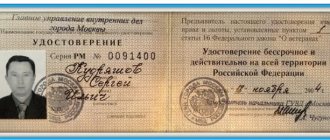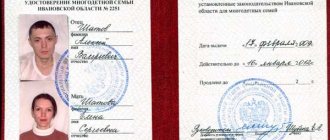Combat veteran
In accordance with Law No. 5-FZ “On Veterans,” military personnel who took part in hostilities and permanently reside in the Russian Federation have the right to receive the status of combat veteran. According to the law, veterans include:
- military and retired employees of law enforcement agencies of the USSR and the Russian Federation who took part in hostilities;
- military personnel, employees of law enforcement agencies who took part in demining the USSR in the period 05/10/1945-12/31/1951;
- employees of military motor vehicle battalions in Afghanistan;
- pilots who flew from the USSR to Afghanistan, providing support to the infantry;
- persons who worked in Afghanistan between the end of 1979 and the end of 1989;
- persons who were engaged in servicing Soviet and Russian military units on the territory of other states, and were injured and/or maimed, as well as military personnel who received an award for their service;
- employees who took a direct part in military operations in Chechnya.
Combat veterans who registered for housing after 01/01. 2005
–Home
–
Property management
–
Implementation of housing programs
–
Combat veterans who registered for housing after 01.01. 2005
Providing housing for veterans, disabled combat veterans, family members of fallen (deceased) veterans and disabled combat veterans in need of improved housing conditions and registered after January 1, 2005,
carried out in accordance with the housing legislation of the Russian Federation.
An exhaustive list of grounds for recognizing citizens as needing improved housing conditions is established by Article 51 of the Housing Code of the Russian Federation. These grounds include:
- the citizen and his family members do not have any housing under a social rental agreement or in their own property;
— the provision of total living space per family member is less than the accounting norm;
- living in premises that do not meet the requirements established for residential premises;
- living in an apartment occupied by several families, if the family includes a patient suffering from a severe form of a chronic disease, in which living together with him in the same apartment is impossible, the absence of other residential premises occupied under a social tenancy agreement or owned by right of ownership.
To be registered, a citizen submits an application for registration to the local government body at his place of residence. Copies of the following documents are attached to the application, along with the simultaneous submission of the originals:
1. passport or other documents identifying the applicant and persons indicated as members of his family;
2. information about the composition of the applicant’s family, provided by the official responsible for registration of citizens of the Russian Federation at the place of stay and residence, for 5 years preceding the date of filing the application. Information about the family composition of persons living in state or municipal housing stock is requested by local government bodies independently in the manner of interdepartmental interaction;
3. a decision of the authorized body to recognize a citizen as low-income and (or) documents confirming that the applicant belongs to the category of citizens defined by federal law or the law of the Perm Territory who have the right to receive residential premises provided under a social tenancy agreement;
4. documents confirming the right to be recognized as needing housing, namely:
4.1. documents confirming the right to use the residential premises occupied by the applicant and persons indicated as members of his family (lease agreement, decision to provide residential premises, court decision to move in, etc.). This provision does not apply to applicants who are tenants of municipal or state housing stock, as well as to owners of residential premises, the rights to which are registered in the manner prescribed by law in the Unified State Register of Rights to Real Estate and Transactions with It;
4.2. title documents for real estate objects, the rights to which are not registered in the Unified State Register of Rights to Real Estate and Transactions with It;
4.3. documents confirming the non-compliance of the occupied residential premises with the established requirements;
5. documents confirming the right to priority provision of residential premises under a social tenancy agreement.
Veterans, disabled combat veterans, family members of fallen (deceased) veterans and disabled combat veterans who registered after January 1, 2005, have the right to be provided with housing under a social tenancy agreement.
According to Article 57 of the Housing Code of the Russian Federation, the provision of residential premises to citizens under a social tenancy agreement is carried out in order of priority according to the date of registration.
The provision of residential premises on an extraordinary basis is provided in two cases:
1. if a citizen lives in a residential building that is unfit for habitation and cannot be repaired or reconstructed,
2. in the case of living in an apartment occupied by several families, if the family includes a patient suffering from a severe form of a chronic disease and does not have other living quarters.
To confirm the priority right to provide housing, the following documents must be submitted to the local government body at the place of residence:
- conclusion of the interdepartmental commission on the recognition of the occupied residential premises as unsuitable for habitation,
- conclusion of a medical commission confirming the presence of a severe form of chronic disease, named in Decree of the Government of the Russian Federation of June 16, 2006 No. 378 “On approval of the list of severe forms of chronic diseases in which it is impossible for citizens to live together in the same apartment.”
Normative legal acts:
Housing Code of the Russian Federation.
Federal Law of January 12, 1995 No. 5-FZ “On Veterans”.
Law of the Perm Region of November 30, 2005 No. 2694-601 “On the procedure for local government bodies to keep records of citizens as those in need of residential premises provided under social tenancy agreements”
How and where to obtain combat veteran status
Obtaining veteran status occurs in accordance with Law 5-FZ. You can receive it if the serviceman can document his participation in one of the localities. Assignment of status is accompanied by the issuance of an official document - a certificate. In order to receive it, you need to contact the social protection authorities and submit a certain package of documents.
Obtaining veteran status follows the following procedure:
- First of all, you need to fill out an application and collect the necessary list of documents.
- After this, you will need to contact the social security authority in accordance with your place of residence.
- Wait at least 30 days for the submitted documents to be checked to ensure that the information contained therein is true.
- If the decision is positively made, the status of “veteran” will be granted and an order on the basis of which a combat veteran certificate will be issued. If the status is denied, the applicant will be sent a response within 5 days.
Important! A veteran's ID allows its holder to enjoy certain benefits and receive payments.
How is a certificate for an apartment issued to military personnel?
First, you need to obtain the status of someone in need of improved living conditions, only after that you can submit a report to receive a certificate. Since the end of 2021, according to the Order of the Ministry of Defense, such issues have been considered by the Federal State Autonomous Institution “Roszhilkompleks”.
Federal State Autonomous Institution "Roszhilkompleks" is divided into 5 territories; you need to send a request to your place of duty.
Contacts and addresses of all divisions of the Federal State Autonomous Institution “Roszhilkompleks” are here. →
Package of documents:
- identity card of the military personnel and members of his family;
- extracts from the service record;
- certificate of service and duration of service, family composition;
- copies of certificates of marital status;
- extracts from house books from the places of residence of the serviceman and all members of his family for the last 5 years (not required, you can provide a document stating the impossibility of obtaining them);
- TIN numbers of all family members;
- information about the personal property of the applicant and his family members.
After submitting the documents, their review begins. Within 30 working days, a decision is made on whether a military person is recognized as needing housing or not. If this is approval, information about the citizen is entered into a special register.
This is only half the battle. Now you need to submit your passport specifically for the state housing certificate for military personnel. It is served at the place of duty. Here you also need to collect a package of documents: registration information, an extract on the length of service, a military ID, passports and birth certificates of family members. If a citizen is fired, a certificate from the dismissal order is needed.
The report is submitted in advance. If you want to receive a military housing certificate in 2021, the report must be submitted between January 1 and July 1, 2021.
Important points of the law
- State housing certificates for military personnel are personal;
- It is impossible to cash out a military certificate; it can only be used to purchase housing;
- This is a short term document. From the date of issue until the moment of presentation to the bank for a mortgage or the registering authority, it is valid for 3 months.
Subsidies for combat veterans to purchase housing
Veterans who have the appropriate status and a supporting certificate and who have a disability have the right to receive a subsidy for the purchase of an apartment or the construction of a house. Members of a veteran's family are also entitled to this benefit if the military personnel died upon returning from war or went missing. A veteran can receive a subsidy if he does not have his own apartment or house, and also if the area of this housing does not meet established standards.
The subsidy is allocated in an amount calculated based on 18 sq.m per 1 family member of a veteran and the cost of 1 sq.m of an apartment in the region of residence. In order to receive such a payment, a veteran needs to submit an application to the authorized body. The application will be reviewed within 1 month and if the decision is positive, the veteran will be included in the queue for a housing subsidy. The final stage of subsidizing is the transfer of funds to a bank cooperating with this program. The veteran is given a certificate on the basis of which he has the right to use the money.
Important! The condition for the transfer of funds is an agreement for the purchase of an apartment or the construction of a house.
Social support for war and combat veterans
Participants and disabled people of the Great Patriotic War, residents of besieged Leningrad, disabled people and combat veterans, home front workers have the right to social support measures, the provision of which is under the special control of executive authorities.
Current legislation provides for the provision of social support measures to all of the above categories under federal authority, with the exception of home front workers, who are regional beneficiaries.
Federal Law No. 122-FZ of August 22, 2004 replaced the in-kind benefits previously provided to them, including travel, dental prosthetics, subscription fees for using the telephone and radio, and replaced them with monthly cash payments .
State social assistance is also provided in the form of a set of social benefits, which includes: medication provision, sanatorium-resort treatment and free travel on suburban railway transport and on intercity transport to the place of treatment and back.
The implementation of these social support measures is carried out:
- state institution - Branch of the Pension Fund of the Russian Federation for the Rostov Region;
- state institution - Rostov regional branch of the Social Insurance Fund of the Russian Federation.
Social support measures for payment of housing and communal services to federal beneficiaries are provided in accordance with Decree of the Government of the Rostov Region dated December 09, 2011 No. 212, according to which the calculation of compensation for expenses for payment of housing and utilities is carried out by the social protection authorities of the population of municipal districts and urban districts of the Rostov region to each recipient for one residential premises individually, taking into account the scope of social support measures established by legislative acts and information received from organizations that carry out settlements for payment of housing and communal services, on the basis of concluded interaction agreements.
Federal beneficiaries are confirmed with the right to preferential travel in urban and intra-district transport on the basis of a document on the right to benefits and a unified social travel card worth 287.0 rubles. per month (number of trips is not limited).
Home front workers, in accordance with the Regional Law of October 22, 2004 No. 163-ZS “On Social Support for Home Front Workers,” retained the volume of social support measures provided before 01/01/2005 in accordance with federal legislation and were granted the right to:
free dental prosthetics (except for the cost of paying for the cost of precious metals and metal-ceramics), as well as free provision of other prosthetics and prosthetic and orthopedic products,
50 percent discount on the cost of medicines prescribed by a doctor,
free travel on the territory of the Rostov region, regardless of the place of registration, on all types of urban passenger transport (except taxis), on public motor transport (except taxis) on suburban and intra-district routes;
free travel on suburban railway transport, on suburban intermunicipal and intercity intraregional road transport and payment of 50 percent of the cost of travel on suburban water transport.
Free travel is provided using unified travel coupons or social travel cards issued by the social protection authorities of municipalities free of charge and without an expiration date.
In accordance with the Regional Law of October 22, 2004 No. 174-ZS “On targeted social assistance in the Rostov region,” low-income families or low-income citizens living alone, whose average per capita income is below the subsistence level in the region, are provided with targeted social assistance in the form of social benefits, in including families with federal beneficiaries.
The authority to provide social support measures to provide housing for veterans relates to the expenditure obligations of the Russian Federation.
The provision of social support measures to provide housing for veterans of the Rostov region is carried out in accordance with the Decree of the Government of the Rostov Region dated June 25, 2012 No. 541 “On the procedure for providing social support measures to provide housing to veterans, disabled people and families with disabled children”, adopted in pursuance of the Federal laws “On Veterans” and “On Social Protection of Disabled Persons in the Russian Federation”.
According to this resolution, the measure of social support for providing housing at the expense of the federal budget is provided to:
- veterans of the Great Patriotic War, family members of deceased (deceased) disabled people and participants of the Great Patriotic War, recognized as in need of improved housing conditions - regardless of the date of registration;
- veterans and disabled combatants who registered their apartments before 01/01/2005.
This measure of social support is provided in the form of a subsidy when paying for transactions under sales and purchase agreements, exchange (in terms of surcharges), shared construction in apartment buildings, and the construction of an individual residential building.
The provision of apartments is not provided for by the decree.
The beneficiary has the right to receive the subsidy.
The amount of the subsidy per beneficiary is calculated based on the housing provision norm - 36 sq.m (for WWII veterans, family members of deceased disabled people and WWII participants) and 18 sq.m (for veterans and disabled combatants) and the average market value 1 sq.m. in the Rostov region, approved quarterly by the Ministry of Construction of the Russian Federation.
Participation in receiving a subsidy is voluntary and of an application nature. Citizens who refuse to receive a subsidy this year retain the right to receive it in subsequent years.
The period for implementation of the subsidy is: for WWII veterans and family members of deceased (deceased) disabled people and WWII participants - 6 months, for veterans and disabled combatants - 9 months.
The list of citizens receiving subsidies is compiled in the same chronological order in which citizens were registered as needing improved housing conditions.
The selection of residential premises for the purpose of purchasing it is carried out by the citizen independently.
In the case of purchasing housing, the cost of which exceeds the amount of the allocated subsidy, the additional payment is made by the citizen at the expense of his own or borrowed funds. Residential premises purchased with a subsidy are registered as the property of the citizen.
The right to receive a subsidy for the purchase of housing at the expense of the federal budget is given to persons with disabilities who suffer from severe forms of chronic diseases, in which it is impossible for citizens to live together in the same apartment (according to the list of severe forms of diseases approved by Decree of the Government of the Russian Federation of June 16, 2006 No. 378 “On approval of the list of severe forms of chronic diseases in which it is impossible for citizens to live together in the same apartment”).
If veterans and disabled combat veterans who were recognized as needing improved housing conditions before 01/01/2005 and who wrote applications for subsidies have severe forms of chronic diseases, the subsidy is provided to them on an extraordinary basis.
Providing housing for veterans is carried out within the limits of federal budget funds received by the regional budget.
In addition, regional legislation provides for combat veterans such a measure of social support as a budget subsidy to pay part of the interest rate on a housing loan (9%) within the framework of the subprogram “Providing measures of state support in improving housing conditions for certain categories of citizens” of the state program of the Rostov region “ Providing affordable and comfortable housing to the population of the Rostov region."
Thus, combat veterans can improve their living conditions in the following ways:
subsidy for the purchase of housing from the federal budget (for those recognized as needing to improve their living conditions before 01/01/2005);
subsidy to pay part of the interest rate on a housing loan at the expense of the regional budget;
provision of housing under a social rental agreement at the expense of the local government in the established order of priority (in the city of Rostov-on-Don, an additional measure is a subsidy for the purchase of housing at the expense of the local budget).
More detailed information on this issue can be obtained on the official website of the Government of the Rostov Region in the section “State support for citizens in purchasing housing.”
Additional measures of social support for veterans of the Great Patriotic War
Annually at the expense of the regional budget:
on Victory Day, all front-line participants in the Great Patriotic War, as well as military personnel who served in military units that were not part of the active army, are provided with one-time financial assistance;
financial assistance is provided to partially pay the costs of gasification of housing for disabled people and participants of the Great Patriotic War, their widows, former minor prisoners of fascism, survivors of the Leningrad siege and home front workers.
Cash compensation for the cost of gasification of housing is up to 20 thousand rubles per household (apartment).
Documents required to receive housing subsidies for combat veterans
When applying for a subsidy, combat veterans must provide a certain list of documents:
- Veteran's ID (original and copy);
- certificate of family composition;
- a document confirming that the veteran has real estate (provided by Rosreestr);
- a document confirming that the veteran needs his own living space or improved living conditions;
- veteran's passport
Important! The veteran is given a certificate for the subsidy; the money is not given or transferred to him.
After receiving the certificate, the veteran enters into an agreement to purchase housing, and if the subsidy is provided for a larger amount than it costs, then the excess money will be returned to the budget.
The essence of the military housing certificate
If a service member meets the criteria established by law and needs housing or improved living conditions, he can submit a report to receive a certificate.
Based on the results of the review, if a decision is made to issue a document, a paper is provided - a military certificate for the purchase of housing of a certain denomination. The denomination depends on:
- on the region where the document was received, namely, on the average price of real estate there;
- In some regions, increasing coefficients are used;
- on the number of family members.
That is, first it is calculated how many square meters of housing the applicant needs. If the applicant is not married, he is entitled to 33 square meters according to the standards, if his family is two people (spouse, child) - 42 meters. If there are more family members, the calculation is 18 meters for each.
For example:
- We are talking about the family of a serviceman: he, his wife and child. The calculation takes into account the 18*3 required by the family, that is, 54 sq.m;
- the average cost per square meter in this region is 30,000 rubles;
- It turns out that a military housing certificate will be issued in the amount of 1,620,000 rubles.
With the face value of the certificate, you can either pay for the purchase of a home in full or add your own funds, mortgage funds, and other subsidies due to the family, for example, maternity capital.
What to do after buying an apartment with a housing subsidy
After a veteran has bought an apartment using a housing subsidy, he registers ownership of it in Rosreestr and has the right to dispose of it at his own discretion. There are no restrictions on the sale, gift or inheritance of an apartment. However, it is worth keeping in mind that a housing subsidy for combat veterans is provided only once, and even if the veteran sells the apartment, it will not be possible to receive the subsidy again (Read also the article ⇒ Second pension for working military pensioners).
An example of a combat veteran receiving a housing subsidy
Ivanov I.I. took part in military operations in Afghanistan. He was not injured during the war, but was awarded a medal. However, all documents for her were burned during the service. At the end of his service, Ivanov applied to the social welfare department in order to receive the official status of “Combat Veteran.” But Ivanov was denied such status on the grounds of his lack of documents for the award and his injuries in battle. Then I.I. I decided to duplicate the documents for my medal. He sent a request to his place of service and received a new certificate for the medal. Upon repeated application to social security, Ivanov was assigned veteran status and issued a corresponding certificate.
After this, Ivanov applied for a housing subsidy. Let’s assume that the cost of 1 sq.m of apartment in the region where he lives at the time of application is 55,000 rubles. Ivanov has a wife and child, which means he will be provided with a subsidy in the amount of 2,970,000 rubles (3 people, 18 sq.m. each, that is, 3 x 18 x 55,000).
conclusions
Based on the above, the following conclusions can be drawn:
- Only a person who takes part in hostilities has the right to receive the status of “Combat Veteran”. In addition, to obtain such status, documentary evidence of participation in hostilities will also be required.
- Veteran status can be obtained from the Social Security Department. After 45 days after sending the application and the necessary documents, the applicant will be issued a veteran's certificate.
- Based on the “Combat Veteran Certificate,” combatants have the right to receive various government support measures, one of which is a housing subsidy.
- A veteran in need of housing or improved living conditions has the right to receive a subsidy for the purchase of housing. The provision of such support measures occurs in accordance with the legislation of the Russian Federation under the control of social protection and executive bodies.
Who is eligible for military housing certificates?
The law clearly defines the circle of military personnel who can receive a housing certificate and acquire their own square meters. But the most important thing is that these people or their families must really need improved living conditions.
Main criteria:
- the military man does not have his own housing (including a share) with an area of more than 18 sq.m.;
- children and other halves of the military are checked. If they have housing in excess of the standard, they will be refused (perhaps there was a deliberate diversion of property);
- The property was previously purchased with a military mortgage.
A military certificate for the purchase of an apartment is issued to a citizen only once. If one of your close relatives has already received it (for example, your spouse is also in the military), the issuance of a second document will be refused.
Now let's look at specific categories of military personnel who can receive a housing certificate. That is, they must need improved living conditions and meet other requirements:
- having served at least 10 years and dismissed due to age or health conditions. That is, a housing certificate is available to military pensioners;
- employees under contract for more than 20 years;
- family members of the deceased receive the right to receive a certificate if the deceased relative had such a right;
- military personnel who were resettled from closed military camps.
The decision to issue a certificate to a serviceman is made by a special commission. To consider the opportunity, you must submit a report and provide a package of necessary documents.








